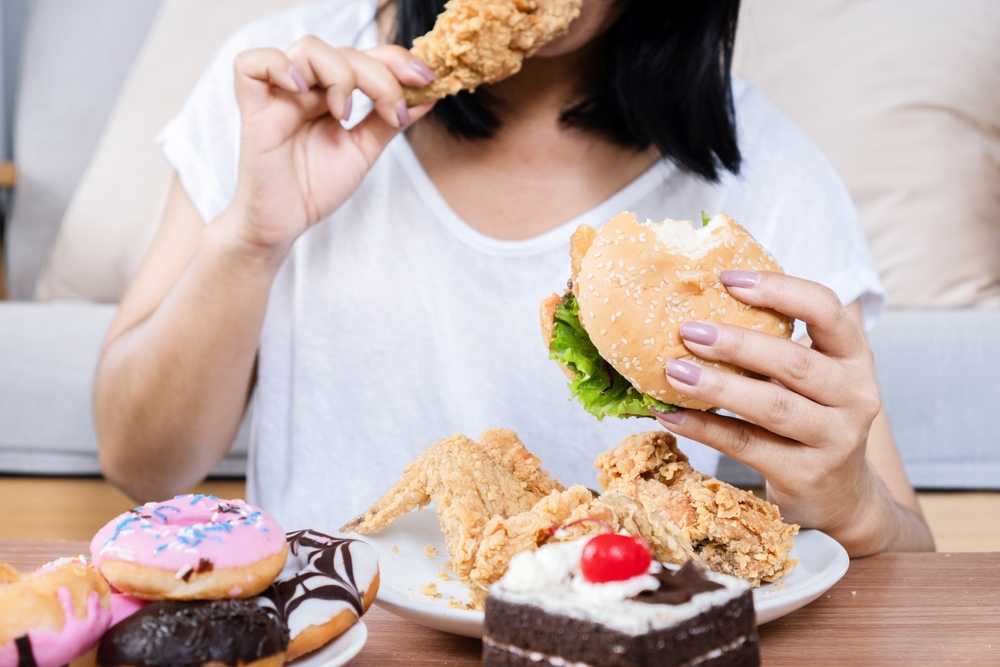
Written by:
Last Updated:
September 29th, 2025
What is compulsive overeating?
Compulsive overeating is when you repeatedly eat large amounts of food, often beyond feeling comfortably full, with a sense of being unable to stop or control your eating. It’s not officially recognised as a distinct eating disorder but shares traits with conditions like binge eating disorder.
Common scenarios include:
- Mindlessly snacking throughout the day without hunger
- Continuing to eat long after you’re full during meals
- Turning to food when bored, stressed or upset, even though you might regret it afterwards.
It often feels automatic or habitual rather than driven by actual hunger, making you feel frustrated or guilty once you realise how much you’ve eaten.

Is compulsive overeating the same as Binge Eating Disorder?
Compulsive overeating and binge eating disorder (BED) aren’t exactly the same, although they share similarities.
People with compulsive overeating may feel they can’t control their food intake but these episodes aren’t always distinct or clearly defined.
Binge Eating Disorder (BED), however, is a specific, clinically recognised eating disorder characterised by clearly defined binge episodes. A binge episode involves:
- Eating significantly larger amounts of food in a short period.
- Feeling a loss of control during the episode.
- Experiencing distress, guilt, shame or embarrassment afterwards.
To be diagnosed with BED, these episodes typically occur at least once a week for three months.
In short, while compulsive overeating refers broadly to uncontrolled eating habits, BED involves more structured episodes and emotional distress and has specific diagnostic criteria.
People with compulsive overeating might benefit from professional guidance or support, while individuals with BED usually require specialised treatment involving therapy and nutritional counselling.
Why do people compulsively overeat?
Some people may foolishly dismiss compulsive overeating as simply “being greedy” or, especially in younger individuals, “just a growing boy or girl”. While these assumptions might occasionally hold true, the reality is that deeper factors usually drive compulsive overeating.
It’s not as straightforward as lacking discipline or having an increased appetite, as there are several underlying reasons why someone might repeatedly eat beyond fullness.
Compulsive overeating might be causing significant disruptions to your life, affecting your self-esteem, physical health and emotional well-being. You may notice unwanted weight gain, difficulty concentrating at work, feelings of guilt or shame after eating and strained relationships due to secretive eating habits. These experiences can leave you feeling stuck, making it seem almost impossible to regain control.
However, laying the foundations to manage compulsive overeating can help you start moving forward:
Should compulsive overeating be treated by specialists?
Some people manage compulsive overeating by identifying triggers and making gradual, conscious changes to their eating habits. By becoming more aware of emotions, situations or habits that cause overeating, it’s possible to reduce the behaviour and regain control independently.
However, many find it challenging to resist compulsive urges consistently or to identify underlying triggers clearly enough to manage them effectively. It could be worth reaching out to professionals if you struggle or feel overwhelmed.
Eating disorder specialists provide targeted support to help you understand and manage your compulsive eating behaviours. They offer structured approaches such as:
Cognitive Behavioural Therapy (CBT)
CBT helps by changing the way you think and feel about food, your body and eating. A therapist works with you to identify negative or distorted thought patterns (e.g., “I have no self-control” or “I deserve food when I’m stressed”) and helps replace them with healthier, balanced thoughts. By reshaping these thought patterns, you’ll gradually reduce impulsive eating behaviours.
Dialectical Behaviour Therapy (DBT)
DBT equips you with practical tools to manage strong emotional triggers that often lead to overeating. It focuses on mindfulness techniques, emotion regulation and stress tolerance skills. Over time, these skills help you become less reactive to emotional situations, reducing the likelihood you’ll compulsively eat when facing stress or discomfort.
Interpersonal Psychotherapy (IPT)
IPT addresses how your relationships and social interactions influence your eating habits. If conflicts, loneliness or social pressures trigger your compulsive eating, IPT helps you explore healthier ways to navigate these challenges without turning to food for comfort.
Visiting a specialist also provides a good opportunity to screen for eating disorders like binge eating disorder. If a diagnosis is confirmed, you’ll gain clarity on exactly what you’re experiencing and why. With this deeper understanding, a personalised treatment plan can be developed, giving you a clear path towards sustainable recovery.
Can Liberty House help me with eating disorders?
If you’re concerned about your relationship with food or think you might have an eating disorder, we are here to support you. Eating disorders can feel overwhelming, but our dedicated team offers compassionate guidance and specialist treatments designed to help you regain control and rebuild your relationship with food.
Remember, you’re not alone and reaching out is an empowering first step. To find out more about how Linwood House and UKAT can support your journey, please contact us today. We’re here to listen, answer your questions and guide you towards a healthier future.


